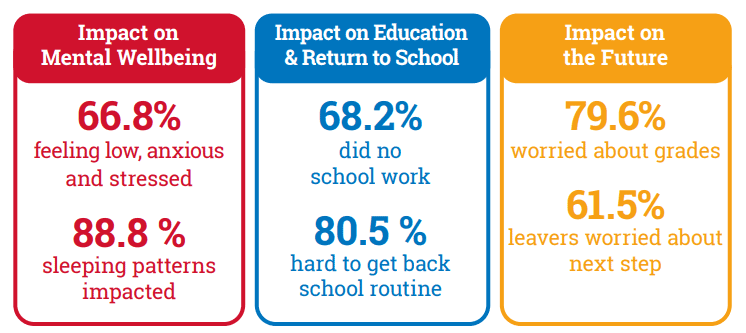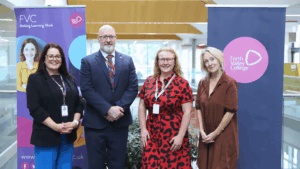In Summary
• Former Children’s Commissioner for England, Anne Longfield CBE, and internationally renowned social researcher Dr Michael Little become MCR Pathways Trustees, joining Lord McConnell and Glasgow’s Executive Director for Education, Maureen McKenna OBE.
• Fay Gingell becomes CEO to lead both Scottish and English expansion and Graeme McEwan becomes MCR’s Vice Chair and executive lead on embedding the MCR model long term in the education and youth employability systems.
• MCR publishes COVID Impact Report showing the charity supported 3,400 young people, delivered over 40,000 mentoring, 1:1 and group work sessions, with 20,000 via its online mentoring platform.
• Despite the pandemic MCR had 1,553 new volunteers signing up and 769 new mentors matched and supporting the young people.
• MCR detailed research on the devastating impact of lockdowns on the young people helped focus COVID recovery plans and targeted support for internet access and other critical services.
• The charity has been recognised with a UK Centre for Social Justice Award to be presented in December and now operating in English schools in Stevenage and other areas of Hertfordshire with multiple discussions in London, southeast and north of England.
• In Scotland, The Scottish Government, supported by the Hunter Foundation commit to providing £24m to MCR over the next 6 years to work in partnership with schools and local authorities to reach 15,000 young people.
MCR Pathways has today published their COVID Impact report and announced significant Trustee and senior management appointments to help reach many more young people across Scotland and England.
Two new Trustees have been appointed in Anne Longfield CBE who was previously England’s Children’s Commissioner and remains heavily involved in education practice and policy. Joining her is Dr Michael Little who has led research teams in the UK and US influencing government policy on improving the health and development of young people. They will join Lord McConnell former First Minister and past Education Minister, Maureen McKenna who will shortly retire as Glasgow’s Executive Director for Education, Iain MacRitchie MCR’s Founder and Chair and Nick Walters an organisation growth and transformation specialist.

Anne Longfield summed up the views of the Trustees:
“I’m delighted to be joining the board of trustees of MCR Pathways. Thousands of young people have benefited from the organisation’s important work in Scotland, and I look forward to working with the board to help extend those opportunities for young people in England. Young people have had a tough couple of years, and it is vital that they have the help, support and opportunities to help them bounce back and succeed.”
MCR also announced that current CEO Graeme McEwan will become Vice Chair, while Fay Gingell will step up from a Deputy role to the CEO position. Graeme will lead the long-term sustainability to ensure MCR becomes a permanent part of education and youth employability in Scotland and build partnerships with key organisations. Fay will lead MCR across both Scotland and England to put all the processes and management support in place to grow from the 3,000 young people supported each week to 15,000.

Fay Gingell, CEO, commented:
“As a former Headteacher and Local Authority education lead, I understand the damaging and potentially long-standing impact that instability at home can have for young people and their families. MCR provides vital relationships that anchor our young people and give them hope and aspiration. It also has a profound impact on education outcomes and wellbeing. The need post-pandemic is massive, but we are highly motivated and committed to establish MCR mentoring as the norm and key part of a school inclusion strategy for every secondary school across the UK.”

Graeme McEwan, Vice Chair, commenting:
“As the country recovers from the pandemic it is critical that we support vulnerable young people who have been disproportionately impacted and need our help most. MCR mentoring is transformational and we are working in pioneering partnerships with Government, Local Authorities, Schools and businesses to ensure that our programme is embedded in the education system. This will help to ensure that no young person is left behind and that they, their families and communities will benefit for years to come.”

Iain MacRitchie, MCR founder and Chair said:
“It is a huge privilege to have led a team of such committed individuals and army of volunteer mentors determined to ensure young people are always defined by their talent and potential and never their circumstances. MCR mentoring is transformational for young people’s education outcomes, job choices and life chances. Mentors not only make but also experience a life changing difference. The benefits for all give an incredible opportunity to not only impact one generation but to have a ripple effect in many more.”
“COVID has been devastating but throughout the pandemic the MCR team have worked tirelessly to support the young people. The partnership with schools is inspired and we are very excited to support school inclusion plans for both learning and wellbeing and to closing the engagement and attainment gaps across the country.”
Despite the impact of lockdowns and the huge disruptions school experienced, MCR was able to support 3,403 young people across Scotland. Over 40,000 mentoring, 1:1 support and groupwork sessions were carried out with 20,636 of these being delivered on MCR’s virtual mentoring platform. 1,557 new mentors registered and the local teams from Ayrshire to Aberdeenshire and Lanarkshire to Lerwick managed to match 769 new mentors, giving critical support and encouragement to young people.
With funding from Scottish Government and JP Morgan, MCR was able to distribute 330 laptops and data packages within weeks of lockdown to those that were the most isolated and had no internet access. This was all driven by the feedback from one of the most comprehensive surveys of care experienced and young people experiencing disadvantage in Scotland.
Over 1,000 detailed responses showed that almost 70% were not able to do any schoolwork during the first lockdown. The insight was invaluable with 49.1% feeding back that education materials issued were too hard to understand, 26.7% restricted by additional caring duties and 42.1% requesting printed copies given their difficult online experiences. MCR was able to target help to those without voice and provided equipment and support to the 14.5% who did not have IT or internet access and 19.5% who did not have suitable space at home.

MCR made 10 key recommendations which formed key parts of the COVID recovery plans. Critically this included the need to recognise schools had to be open fulltime and were much more than just places of education. For the young people and communities, it is important to reframe schools as safe havens, community hubs and critical learning spaces where essential trusted relationships, opportunities and aspirations are formed.
Given the MCR impact, the Scottish Government announced in March that they would invest £19.4m to support the expansion of the MCR Programme across Scotland. In addition, the Hunter Foundation donated £7.5m to MCR mentoring and a leadership development initiative. The MCR element will be match funded by local authorities as they recruit the MCR Pathways Coordinators in each school.
MCR will now grow to 300 schools and 15,000 young people supported each week. This marks a major strategic milestone in MCR’s objective of reaching every young person who is experiencing disadvantage nationally whilst being made a permanent part of the education system.
As John Swinney Deputy First Minister said at the time:
“I’m delighted to announce £19.4 million of Scottish Government funding to support a 6-year mentoring programme by MCR Pathways to help young people reach their full potential. This programme will be delivered in partnership with local authorities that wish to participate and will be part of the Scottish Government Young Person’s Guarantee to provide long-term support where it is needed most.”
MCR England launched in September supported with funding from Impetus in partnership with The Henry Smith Charity. They announced in May the launch of their ‘Engage Fund’ backing charities tackling school exclusions and MCR is one of the recipients for England. MCR is now established in its first schools in Stevenage and other areas of Hertfordshire. Discussions have started in parts of London as well as northern towns and areas.
The development is being accelerated with the recognition for MCR of a UK Centre for Social Justice (CSJ) Award, to be presented at a ceremony in London in December. CSJ Awards are an annual, high-profile award that honours the best grassroot, poverty-fighting charities and social enterprises from across Britain.







